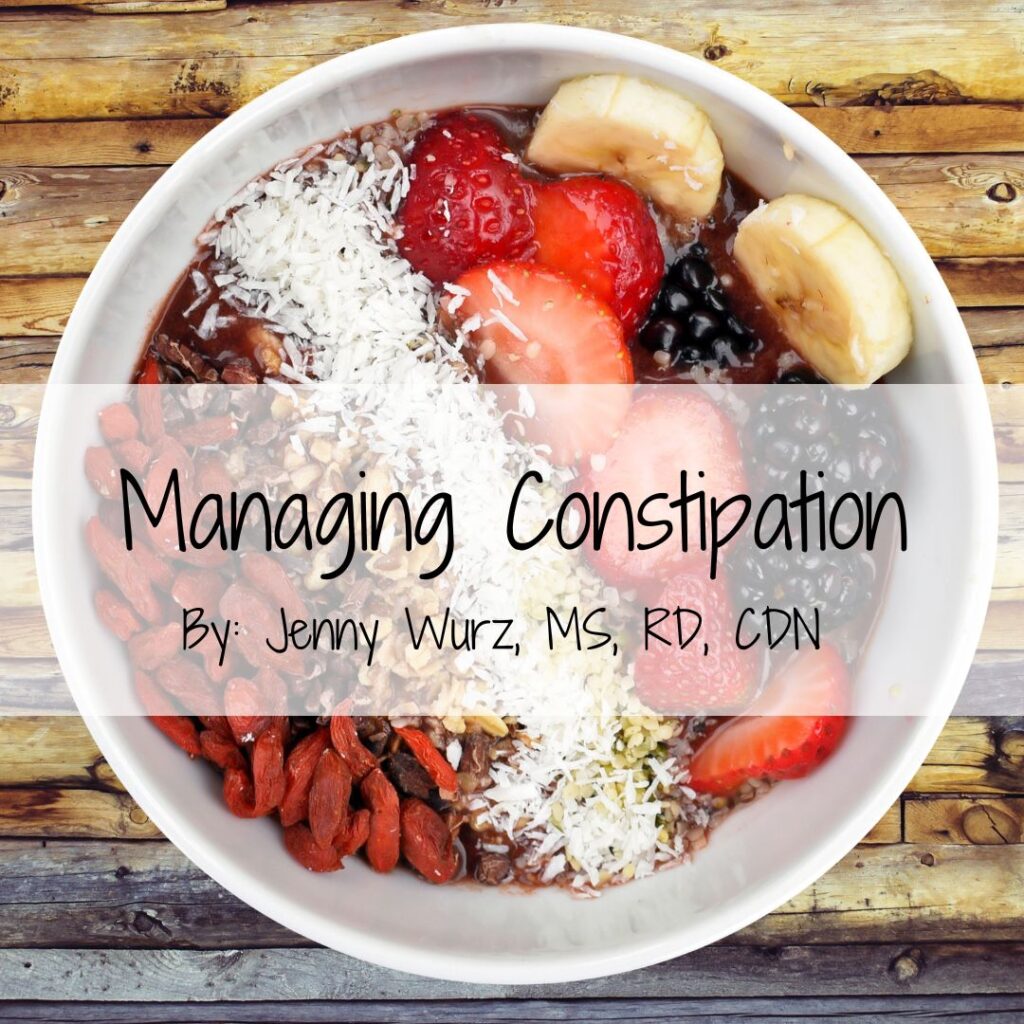
Poop! Many people find this topic uncomfortable but for Dietitians it can be a daily topic in the workplace. Why, you might ask!? Poop, or stool as we call it in the medical community, is a direct reflection of the health and integrity of the Gastrointestinal tract aka the GI tract. The GI tract includes the mouth, throat, esophagus, stomach, small intestine, large intestine, and the rectum. While the GI tract is well known for helping us to break down foods in order to obtain energy and absorb nutrients, you may be interested to know that it also plays a key role in regulating our hormones, impacting our inflammation levels body-wide, and regulating our overall mood and mental health. Healthy and consistent stools help to ensure our body is operating smoothly so we can feel our best!
A lack of consistent and easy to pass stools can lead to constipation. While most people have experienced this at some point in their lifetime, chronic constipation is what we are concerned about. The symptoms of constipation can also vary making it confusing to identify. Some symptoms include but are not limited to the following:
- Difficulty or pain when passing stools
- Passing incomplete stools
- Feeling bloated and/or uncomfortable
- Feeling sluggish and/or irritable
- Abdominal pain
- Difficulty eating your normal amounts of food
- Unintentional weight loss
- Nausea and/or vomiting
One of the best ways to avoid constipation or to help with current constipation is to get adequate fiber from foods – but what exactly IS fiber!? In short, it is the part of plant-based foods that move through the GI tract without being broken down or digested. There are two types of fiber, soluble and insoluble fiber, and both are equally important.
Soluble fiber helps to create a gel-like substance which bulks the stool while insoluble fiber attracts water into the stool making it softer and easier to pass. Many sources of natural fiber contain a nice mixture of both soluble and insoluble fiber. Since fiber is naturally found in plant sources, choosing foods such as fruits, vegetables, legumes, nuts, seeds, and whole grains will help you to reach your fiber needs. Below is a list of some particularly high fiber sources within each of these categories.
High Fiber Sources Include:
- Green peas, 1 cup = 9 g
- Black bean pasta, 1 cup = 9 g
- Lentils, ½ cup cooked = 9 g
- Raspberries, 1 cup = 8 g
- Beans (black, kidney, pinto, etc.), ½ cup = 6-7 g
- Whole wheat pasta, 1 cup = 6 g
- Apple or pear, 1 fruit = 5 g
- Cooked quinoa, 1 cup = 5 g
- Broccoli, 1 cup = 5 g
- Brussels sprouts, 1 cup = 4 g
- Potatoes, 1 cup = 4 g
- Almonds ¼ cup = 4 g
- Chia seeds, 1 TBSP = 4 g
- Flax seeds, 2 TBSP = 3 g
- Orange or banana, 1 fruit = 3 g
It is recommended that adult women get 25 grams of fiber per day and that adult men get 38 grams of fiber per day. Fiber needs may increase for pregnant women while the elderly may benefit from slightly less fiber per day. The average American diet is low in fiber and often falls short of the estimated needs. If your fiber intake is low, it is important that you increase your fiber intake gradually vs all at once to avoid abdominal pain, excessive bloating and/or excessive gas. Additionally, increasing fiber intake too quickly without also increasing your daily fluid intake (if needed) can itself result in constipation.
Adequate fluid intake is another important consideration as it helps to move foods smoothly through the GI tract. Even mild dehydration can cause constipation. Fluid does not necessarily have to be plain water – sparkling water, milk or milk alternatives, and teas can all count towards your daily fluid needs.
While getting enough fiber and fluid in each day are some of the main tools to combat constipation – it is possible to meet or even exceed both of these needs and still experience constipation due to undereating. Whether intentional or not, undereating creates less fecal matter to form stool in the GI tract, making stools harder and less frequently passed. Undereating also alters the metabolism, causing it to slow down, which in turn can cause constipation. Determining how much food you need can be tricky as factors such as gender, age, height, your current amount of exercise or movement, and any medical diagnosis can all impact how much food we need each day. We also live in a society that tends to focus on diet culture – a practice which has taught many people to disconnect from the body and ignore things like hunger cues and feelings of satiety – bodily signals which can help us to get the nourishment we need. A Registered Dietitian can help you determine your energy needs and provide you with coaching around reconnecting to your normal bodily signals of hunger and fullness.
Movement and exercise can also aid in passing regular stools. The current Physical Activity Guidelines for Americans recommends getting 150 minutes per week of moderate-intensity physical activity (such as a brisk walk) or 75 minutes per week of vigorous-intensity aerobic activity per week (such as jogging or running). While this may seem daunting at first, meeting our weekly movement needs can be done by simply walking for 30 minutes 5 days per week or walking for about 20 minutes daily. If you’re someone who doesn’t exercise much at all, even just a short 10 minute walk is a great way to get started.
Another big contributor to constipation is stress. When we feel mentally stressed, the stress signal is relayed by our brain to our GI tract. Our GI tract can respond to this by slowing our entire digestive process down which will cause stool to move slower through the GI tract and – you guessed it! – can result in constipation. Stress management including adequate and quality sleep, breath work, and embracing activities to help us unwind can all help to relieve constipation. Gentle yoga or digestive yoga can help to calm stress and provide a massage for your internal organs to help stool get moving.
While each of these points are important, balancing them all together is the true key to alleviating constipation or preventing it from occurring in the first place. If these items are all being met but constipation persists it is possible that an underlying gastrointestinal issue, nutrient deficiency, or dietary sensitivity or intolerance may be present. Medications can also contribute to constipation so check with your pharmacist or prescribing physician. This can be determined with the help of your Dietitian, Primary Care Provider, and Gastroenterologist. Let us know in the comments below, what are your favorite high fiber recipes?


